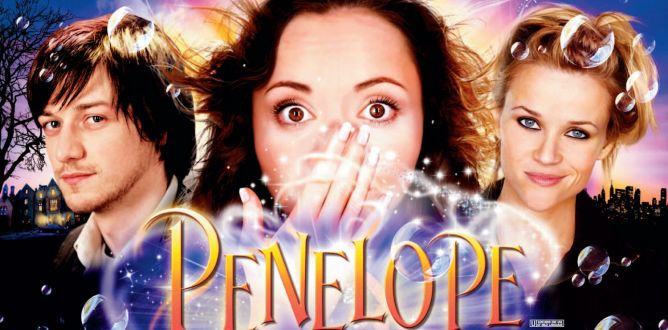Penelope Parent Guide
Parent Movie Review
Penelope Wilhern (Christina Ricci) has a problem—and it isn’t just her appearance. Being born with the family curse - a pig snout instead of a human nose - is hard enough, but her mother’s (Catherine O’Hara) obsessive attempts to keep her hidden from the public are even worse. Since birth, the little girl has been penned up in colorful, well-furnished but solitary confinement on the family estate. Safe from inquisitive onlookers and prying paparazzi, her looks have remained a secret. Now, however, Penelope has grown up and to break the curse, she must find someone who will love her for who she is, face and all.
Hiring an agent (Ronni Ancona) from an upper scale dating service, Penelope’s mother tries desperately to set her daughter up with any blue blooded potential husband. But the sight of Penelope’s porcine proboscis sends the potential suitors running from the house, sometimes through a second story window.
Max Campion (James McAvoy), however, is different. The scruffy-looking young man is a compulsive gambler who seems intrigued with the pleasant young woman who keeps herself hidden behind a two-way mirror. But unbeknownst to the Wilherns, he’s also being paid by Lemon (Peter Dinklage), an unscrupulous newspaper reporter, to snap a photo of the mysterious heiress.
When the news of Max’s secret mission finally breaks, Penelope covers her face with a scarf and flees from the gated compound to experience life on her own. In a smoky pub, she orders beer on tap and becomes drunk after downing five pints of the brew. She also meets Annie (Reese Witherspoon), a rough-around-the-edges delivery girl who befriends the lonely socialite and introduces her to life on the streets.
This fairy tale fable includes some sexually-oriented innuendo and comments, mostly about male anatomy, as well as some mild vulgarities and profanities. Smoking, frequent drinking and games of chance are also portrayed, along with a veiled depiction of suicide. Unfortunately, these adult-oriented behaviors distract from a message that is not only suitable, but also worthwhile for a larger portion of the movie viewing populace.
Once freed from the grasp of her overbearing mother and browbeaten father (Richard E. Grant), Penelope finds a whole new world of adventures and opportunities awaiting her in London. Rather than being handicapped by her unique facial feature, Penelope discovers that sometimes the answer to life’s challenges is as plain as the nose on your face.
Starring Christina Ricci, James McAvoy, Catherine O'Hara, Reese Witherspoon.. Theatrical release February 28, 2008. Updated May 23, 2020Watch the trailer for Penelope
Penelope
Rating & Content Info
Why is Penelope rated PG? Penelope is rated PG by the MPAA for thematic elements, some innuendo and language.
After her birth, Penelope’s mother becomes obsessive about protecting her daughter from outsiders. In one case, she hits a reporter in the face, causing him to lose an eye. She also fakes the death of her child. When suitors do show up on the scene, they often jump out of a second story window in order to get away from Penelope. One woman commits suicide after being rejected by a lover. Compulsive gambling, frequent alcohol use (sometimes to the point of drunkenness), smoking and lying are all depicted in this script. Some female cleavage, kissing and brief sexual innuendos are included, along with several mild vulgarities and profanities.
Page last updated May 23, 2020
Penelope Parents' Guide
In what ways can a parent’s attitude about a child’s handicap influence the way the challenge is met? Does Penelope’s mother’s protective approach help or hinder her daughter?
How can one person’s courage inspire others? What effect does Penelope’s decision to leave home have on Max and Lemon?
What does Penelope learn about self-esteem? What impact does her belief in herself have on the way she deals with life?
Loved this movie? Try these books…
Julie Murphy’s novel Dumplin’ features Willowdean Dixon, chubby daughter of a beauty queen mother. Willowdean decides to gain some self-confidence by doing what she fears – entering a beauty pageant. Hilarity, self-knowledge, and changing perceptions ensue. Suitable for teen readers.
Judy Blume’s Deenie is a classic in adolescent self-acceptance. Beautiful 12 year old Deenie is horrified to learn that she has scoliosis and will need to wear a back brace for years. How will she adjust to a life where her brace is noticed before her beauty? Who will she be then? (This book has been updated to reflect changes in the treatment of scoliosis.)
Shannon Hale’s fantasy novel The Goose Girl tells the story of the shy and insecure Princess Anidori Kiladra Taliana Isilee of Kildenree and how a long journey, betrayal, attempted murder, and a fight for justice helps her accept her unusual gifts. For tweens and teens.
Young children will enjoy Karen Katz’s The Colors of Us, a vibrant picture book that celebrates kids of all races. Self-acceptance is also a feature in Natasha Anastasia Tarpley’s I Love My Hair, a picture book that leads young Keyana to accept her African American hair.
Home Video
The most recent home video release of Penelope movie is July 14, 2008. Here are some details…
DVD Release Date: 15 July 2008
The plight of the pig-faced Penelope comes to DVD with a making-of featurette. Audio tracks are available in Dolby Digital 5.1 Surround (English), with subtitles in English (SDH) and Spanish.
Related home video titles:
In Ella Enchanted, a princess who has been cursed to be perfectly obedient, must also learn to take control of her own life. Charming settings and gentle messages all unfold in the delightful story of a pig that overcomes the challenges of barnyard living in the movie Babe. The definition of beauty also undergoes revision in the fairytale spoof Shrek.

